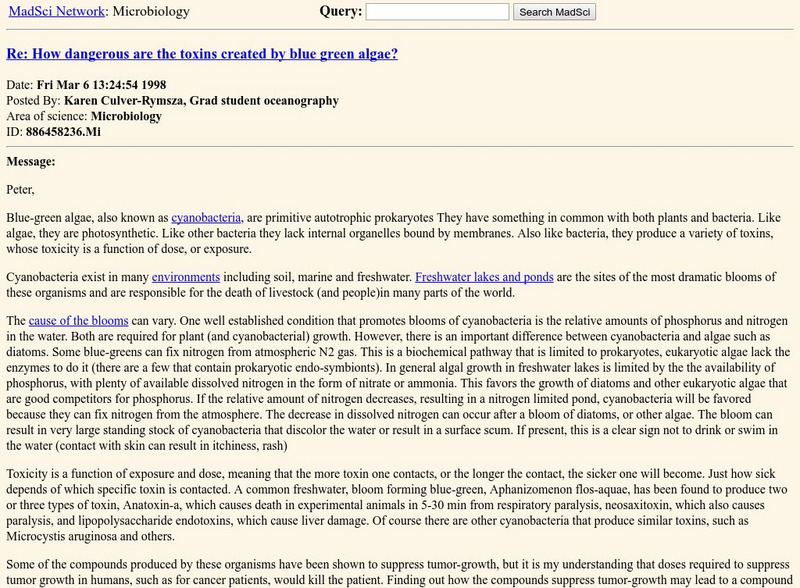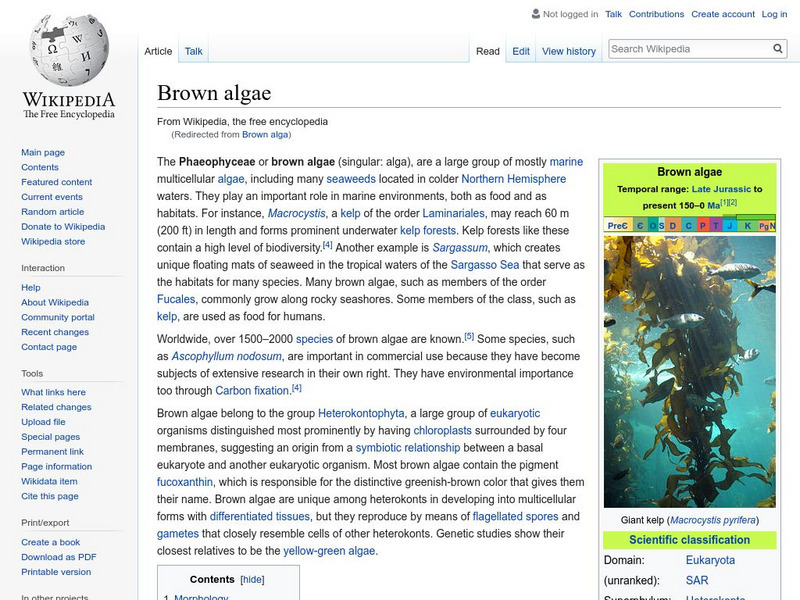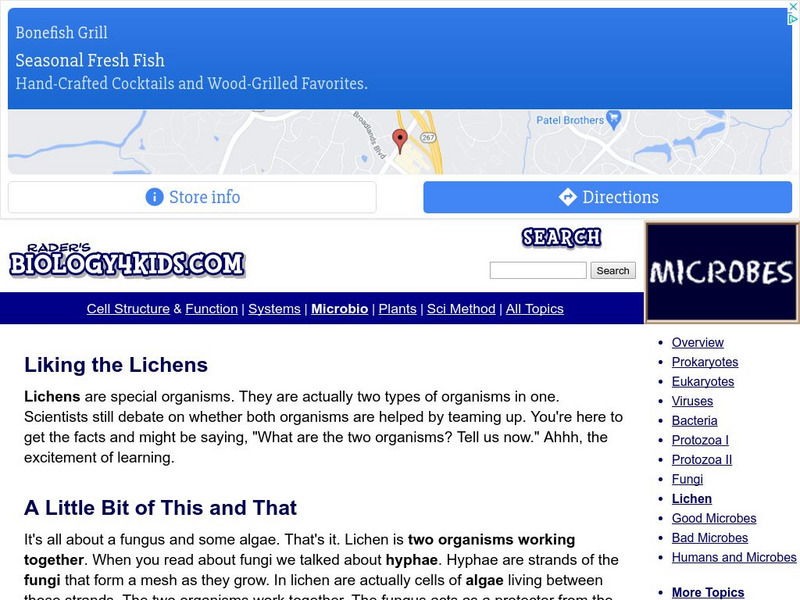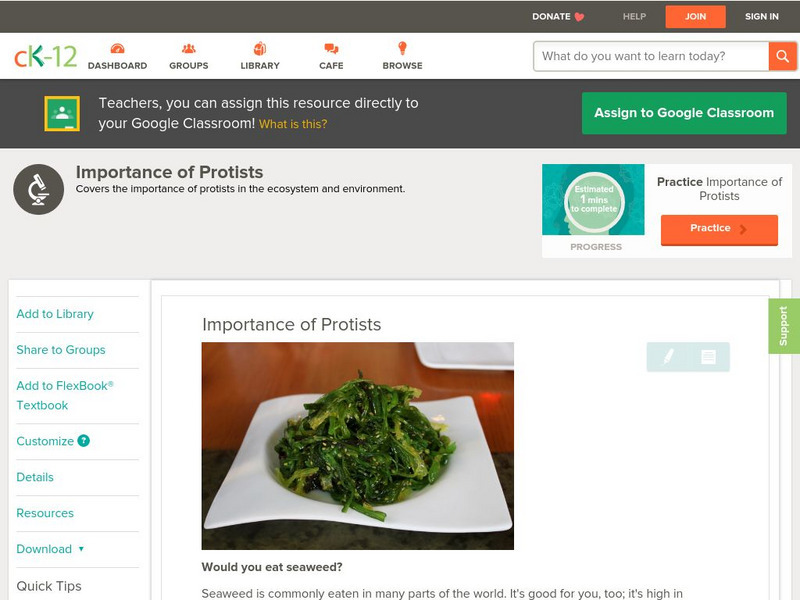MadSci Network
Mad Scientist Network: Toxins of Blue Green Algae
Discusses the dangers of blue-green toxins on humans.
Science Education Resource Center at Carleton College
Serc: There Are Algae in Your House!
In this lesson plan students learn about how algae is used in the food they eat.
Wikimedia
Wikipedia: Brown Algae
Wikipedia offers the short definition of brown algae, a large group of multicellular algae.
abcteach
Abcteach: Ponds
[Free Registration/Login Required] The abcteach directory contains sample pages from their pond unit for non-members. Handouts are in PDF format.
Other
Vhi Healthcare: Blue Green Algae
What is blue-green algae? Is blue-green algae nutritious? This site answers these questions as well as the use of algae in the treatment of diseases.
Other
Foster City Lagoon System
Provides information on a chemical that was added to lagoon systems to reduce odor and algae.
Microscopy UK
Microscopy Uk: Polysiphonia a Red Algae
Defines red algae. Also gives the habitat, reproduction cycle, and lists different species.
Other
The Krib: Control of Red Algae in Freshwater Aquarium
Causes for red algae in the aquarium, eliminating red algae, the role of carbon dioxide, and algae eaters.
Other
Aquascope: Encrusting Red Algae
Habitat, appearance, and classification of red algae. Growth of red algae.
PBS
Pbs Teachers: Scientific American: Alien Invasion: Aquarium Capers
Evaluate the effectiveness of snails as a biological control to combat the spread of an alien alga in the Mediterranean. Grow and culture algal "mats" on microscope slides to observe the grazing behavior of pond snails.
Sophia Learning
Sophia: Microbes: Fungi and Algae: Lesson 2
This lesson explains the existence and importance fungi and algae. It is 2 of 4 in the series titled "Microbes: Fungi and Algae."
Sophia Learning
Sophia: Microbes: Fungi and Algae: Lesson 4
This lesson explains the existence and importance fungi and algae. It is 4 of 4 in the series titled "Microbes: Fungi and Algae."
Sophia Learning
Sophia: Plant Kingdom: Algae: Lesson 1
This lesson will explain the characteristics and function of algae plants. It is 1 of 3 in the series titled "Plant Kingdom: Algae."
Biology 4 kids
Biology4 Kids: We're Likin' the Lichen
Lichen is made up of two organisms. Find out what those two are and how being a combination helps them to survive.
Bio Topics
Bio Topics: Simple Organisms
A worksheet regarding simple organisms, including protazoans, lichens and algae.
Sophia Learning
Sophia: Plant Kingdom: Algae: Lesson 3
This lesson will explain the characteristics and function of algae plants. It is 3 of 3 in the series titled "Plant Kingdom: Algae."
CK-12 Foundation
Ck 12: Life Science: Importance of Protists
[Free Registration/Login may be required to access all resource tools.] Humans could not live on Earth if it were not for protists. Why? Protists produce almost one-half of the oxygen on the planet, decompose and recycle nutrients that...
Other
Net Pets: Red Slime Algae
Describes the reproduction of red algae and the structure of red algae.
BiologyWise
Biology Wise: Reproduction in Algae
Algae are not uniform in their methods of reproduction. Some reproduce sexually and others asexually. Read a brief overview of algae reproduction in this resource.
BiologyWise
Biology Wise: Diatoms Reproduction
Diatoms are a type of algae that reproduces both sexually and asexually. Its characteristics and methods of reproduction are described here.
BiologyWise
Biology Wise: Types of Algae
Discusses the characteristics of four different types of algae.
BiologyWise
Biology Wise: Uses of Algae
Discusses uses of algae in nutrition, products used by humans, pollution control, biodiesel production, Asian medicine, and other ways.
BiologyWise
Biology Wise: Diatoms Facts
Provides information about diatoms, including their physical characteristics, where they can be found, their classification, how they reproduce, how they form diatomaceous earth when they become fossilized, and their importance to...
Science4Fun
Science4 Fun: Protists
What are protists? Illustrated discussion of protists including characteristics, types, major groups, and how they survive.

















